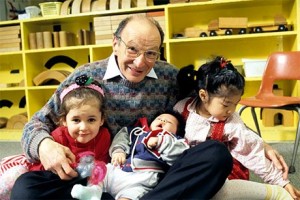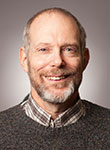 50 years later, recalling a founder of Head Start A half century ago, Cornell developmental psychologist Urie Bronfenbrenner gave Congressional testimony that eventually led to the creation of the Head Start program. 50 years later, recalling a founder of Head Start A half century ago, Cornell developmental psychologist Urie Bronfenbrenner gave Congressional testimony that eventually led to the creation of the Head Start program. |
Language-loss study reveals early signs of A lzheimer's disease Loss of early childhood language skills, rather than those skills attained later in life, might be a predictor for Alzheimer's disease, according to a new Cornell study. lzheimer's disease Loss of early childhood language skills, rather than those skills attained later in life, might be a predictor for Alzheimer's disease, according to a new Cornell study. |
|
|
 18 Cornellians win SUNY Chancellor's Awards for Excellence Eighteen students, faculty and staff in Cornell's contract colleges have won State University of New York (SUNY) Chancellor's Awards for Excellence for 2015. 18 Cornellians win SUNY Chancellor's Awards for Excellence Eighteen students, faculty and staff in Cornell's contract colleges have won State University of New York (SUNY) Chancellor's Awards for Excellence for 2015. |
 Lehman Fund makes 10 awards for China Study Fourteen Cornell scholars received 2015 awards from the Jeffrey S. Lehman Fund for Scholarly Exchange with China. Lehman Fund makes 10 awards for China Study Fourteen Cornell scholars received 2015 awards from the Jeffrey S. Lehman Fund for Scholarly Exchange with China. |
 Prevailing over pain Human Ecology's Translational Research Institute for Pain in Later Life, received a $1.95 million grant from National Institute on Aging. Prevailing over pain Human Ecology's Translational Research Institute for Pain in Later Life, received a $1.95 million grant from National Institute on Aging. |
 Anthony Burrow among faculty saluted by OADI Anthony Burrow among faculty saluted by OADICornell’s Office of Academic Diversity Initiatives held its second annual awards, named after George Washington Fields and 9 other Cornellian trailblazers. |
Students in the News
 Smart choice: Award-winning app connects patients and hospitals Smart choice: Award-winning app connects patients and hospitalsDepartment of Human Development graduate, Anna Zhu '14, developed an app to help patients find the hospital that best matches their health needs. |
 HD Students present their research at 30th CURB forum HD Students present their research at 30th CURB forumHD students were among the 120 undergraduates who presented their research at Duffield Hall as part of the annual event hosted by the Cornell Undergraduate Research Board (CURB) |
More Stories
> Why Americans are obsessed with telling their own stories
> Focus on protecting elderly from fraud and fleecing
> A five-step guide to not being stupid
> How courts should hear from children
> The myth about women in science
> How children develop the idea of free will
New Resources
Urie: The scientist who remade the field of human development Fifty years after the launch of Head Start, Urie Bronfenbrenner-one of the architects of the federal program for underserved families-is remembered as a giant in his field. Former students, research partners, and Cornell faculty members share their thoughts on the late Bronfenbrenner's legacy as a scholar, mentor, researcher, and champion for youth and families. Also in this issue: A tour through 150 Years of Big Red fashion; gerontologist Karl Pillemer's latest book, sharing elder wisdom on love and marriage; long-running, legendary courses in the College of Human Ecology; alumni and campus updates and special sesquicentennial content.
> The Memory Factory





